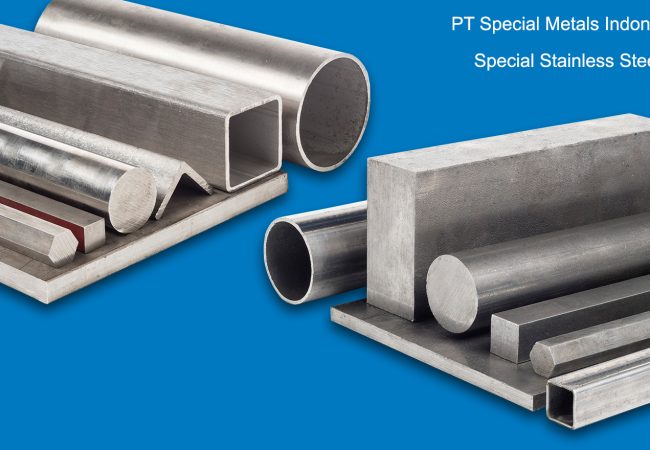SPECIAL STAINLESS STEEL
We supply Special Stainless Steel 316Ti, 317L, 904L. Our range of stainless, high-corrosion, and heat-resistant steels covers a variety of product forms, materials, and dimensions. Special stainless steels represent a material situated between the non-corrosive steels and the nickel alloys. These iron-nickel-chromium alloys differ from ordinary non-corrosive steels by their higher alloying additions of nickel, chromium or molybdenum. These iron-nickel-chromium alloys differ from ordinary non-corrosive steels by their higher alloying additions of nickel, chromium or molybdenum.
• Stainless Steel 316Ti UNS S31635
• Stainless Steel 317L UNS S31703
• Stainless Steel 904L UNS N08904
Products
• Sheet, Plate, Bar, Rod
• Full plates, sheets, Rings, Discs, According to drawing
• Pipa, fittings, flanges, baut, mur
Special Alloy Steel

Special Stainless Steel Alloy 316TI UNS No: S31635 DIN: 1.4571
SS 316Ti is a titanium stabilized version of Type 316 molybdenum-bearing austenitic stainless steel. The Type 316 alloys are more resistant to general corrosion and pitting/crevice corrosion than the conventional chromium-nickel austenitic stainless steels such as Type 304. They also offer higher creep, stress-rupture and tensile strength at elevated temperature. Type 316 stainless steel can be susceptible to sensitization – the formation of grain boundary chromium carbides at temperatures between approximately 900 and 1500 °F (425 to 815 °C) – which can result in rapid corrosion. Resistance to sensitization is achieved in Type 316Ti with titanium additions to stabilize the structure against chromium carbide precipitation, which is the source of sensitization. This stabilization is achieved by an intermediate temperature heat treatment, during which the titanium reacts with carbon to form titanium carbides. This significantly reduces susceptibility to sensitization in service by limiting the formation of chromium carbides. Thus, the alloy can be used for extended periods at elevated temperatures without compromising its corrosion resistance. 316Ti alloy exhibits excellent resistance to oxidation and a low rate of scaling in air atmospheres at temperatures up to 16001650°F (870-900°C).
The molybdenum bearing alloys such as Types 316 and 316Ti stainless steels are more resistant to atmospheric and other mild types of corrosion than the 18Cr-8Ni stainless steels. In general, media that do not corrode 18-8 stainless steels will not attack the molybdenum-containing grades. One known exception is highly oxidizing acids such as nitric acid to which the molybdenum bearing stainless steels are less resistant. Types 316 and 316Ti are considerably more resistant than any of the other chromium-nickel stainless steels to solutions of sulfuric acid. Where condensation of sulfur-bearing gases occurs, these alloys are much more resistant than other types of stainless steels. In sulfuric acid solutions, the acid concentration has a strong influence on the rate of attack.
Resistance of austenitic stainless steels to pitting and/ or crevice corrosion in the presence of chloride or other halide ions is enhanced by higher chromium (Cr) and molybdenum (Mo) content.
What Is AISI 316Ti? This material is also Stainless steel 316 with titanium in small quantities. The percentage of titanium addition is less than 0.5%. Titanium atoms balance the structure of 316 at temperatures higher than 800 ° C. This prevents precipitation of carbide on grain frontiers and protects against corrosion of the metal. This material is used in high temperature and high corrosion applications.
316Ti’s main benefit is its corrosion resistance for a prolonged period of time at high temperatures. Both 316Ti and 316 have comparable mechanical properties.
Special Stainless Steel Alloy 317L UNS S31703 DIN 1.4438
317L is a molybdenum bearing, low carbon content “L” grade austenitic stainless steel that provides improved corrosion resistance over 304L and 316L stainless steels. The low carbon provides resistance to sensitization during welding and other thermal processes.
317L has excellent corrosion resistance in a wide range of chemicals, especially in acidic chloride environments such as those encountered in pulp and paper mills. Increased levels of chromium, nickel and molybdenum compared to 316L stainless steel improve resistance to chloride pitting and general corrosion. Resistance increases with molybdenum alloy content. 317L is resistant to sulfuric acid concentrations up to 5 percent at temperatures as high as 120°F (49°C). At temperatures under 100°F (38°C) this alloy has excellent resistance to solutions of higher concentration. However, service tests are recommended to account for the affects of specific operating conditions that may affect corrosion behavior. In processes where condensation of sulfur-bearing gases occurs, 317L is much more resistant to attack at the point of condensation than conventional alloy 316. The acid concentration has a marked influence on the rate of attack in such environments and should be carefully determined by service tests.
Special Stainless Steel Alloy 904L UNS N08904 DIN 1.4539
Alloy 904L (UNS N08904) is a superaustenitic stainless steel designed for corrosion and pitting resistance in a wide range of process environments. It is used extensively in the chemical process industry including the production of phosphate-based fertilizers.
Alloy 904L (UNS N08904) is a superaustenitic stainless steel that is designed for moderate to high corrosion resistance in a wide range of process environments. The combination of high chromium and nickel content, coupled with additions of molybdenum and copper, assure good to excellent corrosion resistance.
With its highly alloyed chemistry — 25% nickel and 4.5% molybdenum, 904L provides good chloride stress corrosion cracking resistance, pitting and general corrosion resistance superior to 316L and 317L molybdenum enhanced stainless steels.
Alloy 904L was originally developed to withstand environments containing dilute sulfuric acid. It also offers good resistance to other inorganic acids such as hot phosphoric acid as well as most organic acids.
Alloy 904L is easily welded and processed by standard shop fabrication practices.
Untuk kebutuhan SS316Ti, SS317L, SS904L, silahkan menghubungi kami atau HQ kami.

